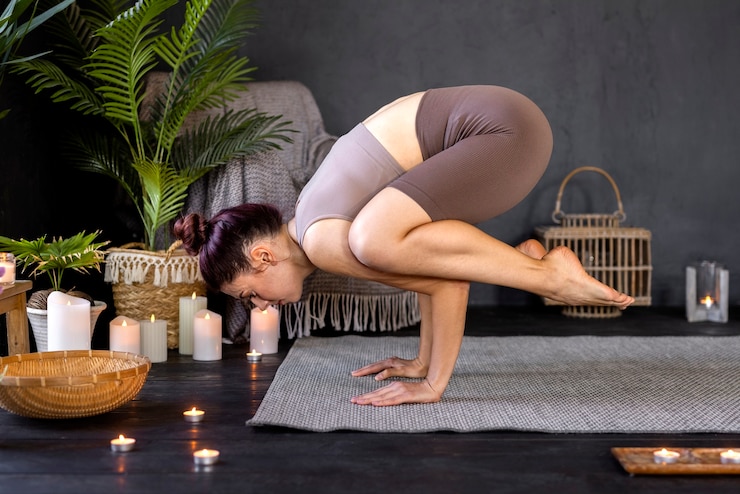Yoga for Beginners: A Gentle Path to Wellness

If you’re looking for a calming, effective, and beginner-friendly way to improve your health, yoga for beginners might be exactly what you need. Yoga is more than just stretching—it’s a practice that connects the body, mind, and breath. And the best part? You don’t need to be flexible or experienced to begin.
Let’s break down what yoga is, how you can start safely, and why it’s a wonderful practice for beginners.
What Is Yoga?
Originating in India thousands of years ago, yoga was developed as a way to unify the body and mind through physical postures (called asanas), breath control (pranayama), and meditation.
While yoga has spiritual roots, you don’t need to follow any religion to benefit from the physical and mental effects of the practice. Many people begin yoga to ease tension, improve flexibility, reduce stress, and feel more present in their everyday lives.
Why Yoga for Beginners?
Choosing yoga for beginners means starting with the basics, learning proper alignment, and understanding your body’s limits. It’s not about perfection—it’s about progress and self-awareness.
Here’s why yoga is ideal for beginners:
- Low-impact and adaptable: You can go at your own pace and modify poses as needed.
- No special equipment required: A simple yoga mat is enough to get started.
- Suitable for all body types and ages: Yoga is inclusive and doesn’t require prior athletic experience.

Benefits of Practicing Yoga as a Beginner
Committing to regular yoga practice can bring significant benefits, both physically and mentally:
1. Improved Flexibility and Strength
Many people come to yoga feeling stiff or tight. With consistent practice, the body gradually opens up. Stretching muscles while building strength supports joint health and reduces the risk of injury.
2. Reduced Stress and Anxiety
Yoga’s focus on breath and mindful movement creates a calming effect. Even a short daily session can quiet the mind and ease stress.
3. Enhanced Body Awareness
Yoga teaches you to listen to your body, notice how you feel, and move with intention. This awareness can lead to better overall wellness and self-care.
Simple Tips to Start Yoga for Beginners
If you’re ready to begin your yoga journey, here are some useful tips:
1. Start Small
You don’t need to practice for an hour. Consistency matters more than length.
2. Find Beginner-Friendly Resources
There are many yoga videos, apps, and classes designed specifically for beginners. Look for slow-paced instruction that focuses on foundation poses.
3. Don’t Push Beyond Comfort
Yoga should never be painful. If a pose doesn’t feel right, ease out or use props like blocks or cushions to support your body.
4. Use Your Breath
Breathing is central to yoga. Try to breathe steadily through your nose and coordinate breath with movement. This helps reduce tension and builds focus.
5. Create a Comfortable Practice Space
Designate a quiet, clean area in your home where you can roll out your mat and practice without distraction. A calm environment supports a calm mind.
Sample Poses for Yoga Beginners
Here are a few basic poses you can try:
- Mountain Pose (Tadasana): Stand tall with feet grounded and spine straight. Focus on your breath.
- Child’s Pose (Balasana): A resting pose to stretch the back and hips while calming the mind.
- Seated Forward Bend: Stretch the hamstrings gently and practice patience with your body.
- Corpse Pose (Savasana): Lie flat on your back and relax completely—perfect for ending your session.
Staying Motivated on Your Yoga Journey
Progress in yoga may feel slow at first, but that’s okay. It’s not about touching your toes—it’s about how you feel inside. The key to success with yoga for beginners is staying patient, showing up regularly, and being kind to yourself.
To stay motivated:
- Keep a yoga journal
- Join a beginner class or online community
- Set small goals, like practicing three times a week
- Celebrate how you feel, not just how you look
Final Thoughts
Yoga for beginners is the perfect way to step into a healthier lifestyle. You don’t need to be strong, flexible, or experienced—just willing to begin. By practicing regularly and listening to your body, you’ll soon notice improvements in how you feel, move, and think.
Remember: yoga is not about competition. It’s about connection—to your breath, your body, and your peace of mind.
Take your first step today. Unroll your mat, take a deep breath, and begin your journey with yoga for beginners. Start small, stay consistent, and let this practice gently transform your life—one pose at a time.